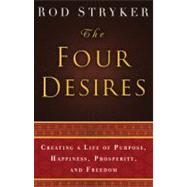
Note: Supplemental materials are not guaranteed with Rental or Used book purchases.
Purchase Benefits
What is included with this book?
| Introduction | p. xi |
| Life Is Desire | |
| The Power of Desire | p. 3 |
| Two Kinds of Fulfillmentp9 | |
| The Four Desires: For the Purpose of Soul | p. 18 |
| Reflections on Warrior II Pose | p. 24 |
| Live Your Mighty Purpose | |
| Dharma: A Tree Bends Toward the Light | p. 29 |
| Understanding Your Mighty Purpose | p. 36 |
| What Is Your Dharma Code? | p. 47 |
| Watch Your Mind Think: The Key to Being Guided All the Time | p. 68 |
| Reflections on Upward-Facing Dog Pose | p. 75 |
| An Intention Formed In The Heart | |
| The Science of Manifesting Intention | p. 79 |
| What Is a Right Desire? | p. 87 |
| The Sankalpa Exercise | p. 96 |
| Reflections on the Pose Dedicated to the Sage Vasistha | p. 112 |
| Overcoming Resistance | |
| The Formula for Fulfilling Your Desires | p. 117 |
| How Much Do You Want What You Want? | p. 125 |
| Reducing the Resistance That Is Keeping You from Having What You Want | p. 138 |
| Relax into Greatness: Soliciting the Cooperation of Your Unconscious | p. 156 |
| Building Momentum to Achieve Your Sankalpa: The Departure Point | p. 174 |
| How Intention Flowers into Fulfillment | p. 183 |
| The Power to Know What to Do | p. 193 |
| The Power to Do What You Know | p. 208 |
| The Courage to Change | p. 217 |
| Reflections on Triangle Pose | p. 224 |
| Freedom From Fear | |
| Man Proposes, the Universe Disposes | p. 229 |
| Your Miracle Angle: Stage One of Non-Attachment | p. 237 |
| Fulfillment May Be Waiting for You (to Change): Stage Two of Non-Attachment | p. 248 |
| Freedom and the Fire of Self-Knowledge: Stage Three of Non-Attachment | p. 253 |
| Reflections on Head-to-Knee Pose | p. 261 |
| The Secret to Success | |
| The Endeavor to Be "There" | p. 265 |
| No Adjustment, No Fulfillment | p. 273 |
| The Pain of Not Changing | p. 283 |
| Afterword | |
| From Now Till Forever | p. 313 |
| Reflections on Perfect Seat Pose | p. 316 |
| Acknowledgments | p. 318 |
| Notes | p. 321 |
| Table of Contents provided by Ingram. All Rights Reserved. |
The New copy of this book will include any supplemental materials advertised. Please check the title of the book to determine if it should include any access cards, study guides, lab manuals, CDs, etc.
The Used, Rental and eBook copies of this book are not guaranteed to include any supplemental materials. Typically, only the book itself is included. This is true even if the title states it includes any access cards, study guides, lab manuals, CDs, etc.